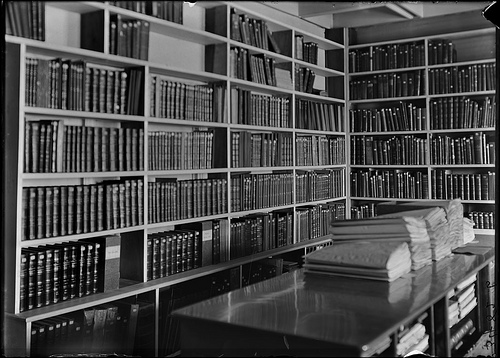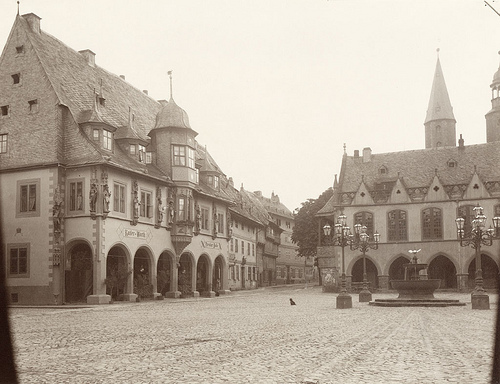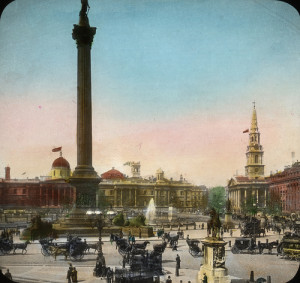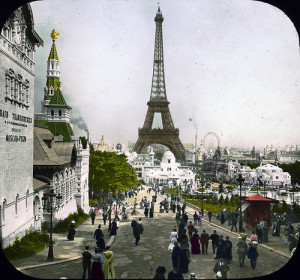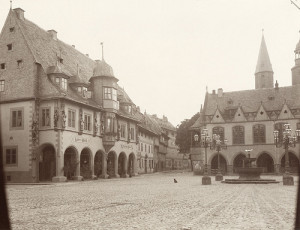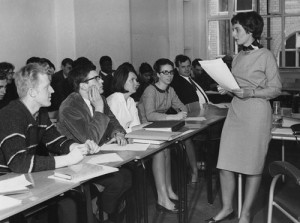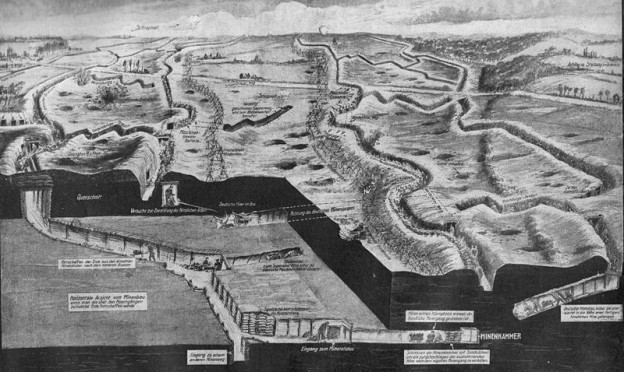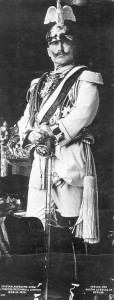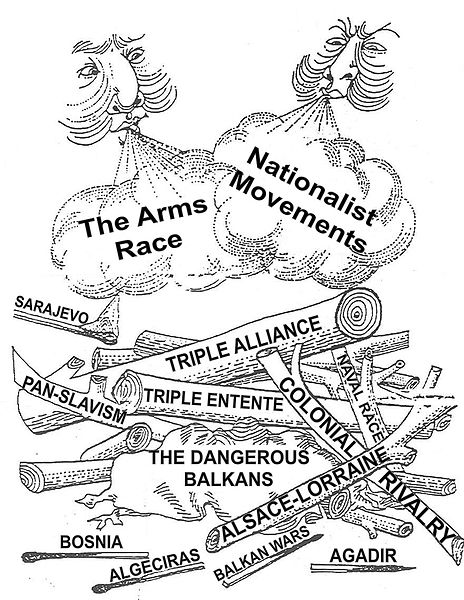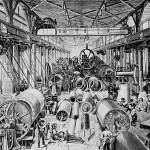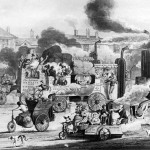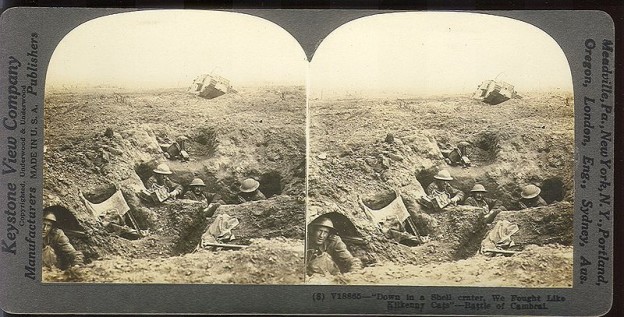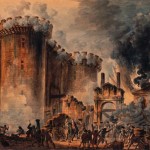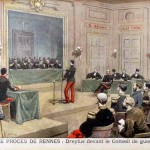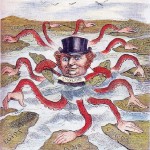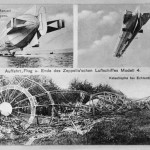Here’s the bibliography I have to draw from for the oral exam. My final preparation task is to make sure I know something about each book, it’s importance (historigraphically, methodologically and historically) and thesis. No biggie, right?
- William Sheridan Allen, The Nazi Seizure of Power: The Experience of a Single German Town, 1922-1945, Rev. ed. (New York: F. Watts, 1984).
- Götz Aly, Cleansing the Fatherland: Nazi Medicine and Racial Hygiene (Baltimore: Johns Hopkins University Press, 1994).
- Benedict R. O’G Anderson, Imagined Communities: Reflections on the Origin and Spread of Nationalism, Rev. ed. (London: Verso, 2006).
- Hannah Arendt, The Origins of Totalitarianism, New ed. (New York: Harcourt Brace Jovanovich, 1973).
- Omer Bartov, Mirrors of Destruction: War, Genocide, and Modern Identity (Oxford: Oxford University Press, 2000).
- Ruth Ben-Ghiat, Fascist Modernities: Italy, 1922-1945, Studies on the history of society and culture 42 (Berkeley: University of California Press, 2001).
- Volker Rolf Berghahn, Germany and the Approach of War in 1914, 2nd ed. (New York, N.Y: St. Martin’s Press, 1993).
- Lenard R Berlanstein, ed., The Industrial Revolution and Work in Nineteenth-Century Europe (London, [England]: Routledge, 1992).
- Richard Bessel, Germany After the First World War (Oxford: Clarendon Press, 1993).
- David Blackbourn, Class, Religion, and Local Politics in Wilhelmine Germany: The Centre Party in Wurttemberg Before 1914 (New Haven: Yale University Press, 1980).
- David Blackbourn and Geoff Eley, The Peculiarities of German History: Bourgeois Society and Politics in Nineteenth-Century Germany (Oxford [Oxfordshire]: Oxford University Press, 1984).
- Rita S Botwinick, A History of the Holocaust: From Ideology to Annihilation, 3rd ed. (Upper Saddle River, N.J: Pearson Education, 2004).
- Christopher R Browning, Ordinary Men: Reserve Police Battalion 101 and the Final Solution in Poland, 1st ed. (New York: HarperPerennial, 1998).
- Roger Chickering, Imperial Germany and the Great War, 1914-1918, 2nd ed., New approaches to European history (Cambridge, U.K: Cambridge University Press, 2004).
- Alon Confino, Germany as a Culture of Remembrance: Promises and Limits of Writing History (Chapel Hill: University of North Carolina Press, 2006).
- Leonore Davidoff and Catherine Hall, Family Fortunes: Men and Women of the English Middle Class, 1780-1850 (Chicago: University of Chicago Press, 1987).
- Simonetta Falasca-Zamponi, Fascist Spectacle: The Aesthetics of Power in Mussolini’s Italy, Studies on the history of society and culture 28 (Berkeley: University of California Press, 1997).
- Caroline C Ford, Creating the Nation in Provincial France: Religion and Political Identity in Brittany (Princeton, N.J: Princeton University Press, 1993).
- Christopher E Forth, The Dreyfus Affair and the Crisis of French Manhood, The Johns Hopkins University studies in historical and political science 121st ser., 2 (Baltimore: Johns Hopkins University Press, 2004).
- Henry Friedlander, The Origins of Nazi Genocide: From Euthanasia to the Final Solution (Chapel Hill: University of North Carolina Press, 1995).
- Saul Friedländer, Nazi Germany and the Jews, 1st ed. (New York, NY: HarperPerennial, 1998).
- Peter Fritzsche, Germans into Nazis (Cambridge, Mass: Harvard University Press, 1998).
- Peter Fritzsche, Life and Death in the Third Reich (Cambridge, Mass: Belknap Press of Harvard University Press, 2008).
- Mary Fulbrook, Twentieth-Century Germany: Politics, Culture and Society 1918-1990 (London: Arnold, 2001).
- Mary Fulbrook, The People’s State: East German Society from Hitler to Honecker (New Haven: Yale University Press, 2005).
- Paul Fussell, The Great War and Modern Memory (New York: Oxford University Press, 1975).
- John Lewis Gaddis, We Now Know: Rethinking Cold War History (Oxford: Clarendon Press, 1997).
- Timothy Garton Ash, The Magic Lantern: The Revolution of ’89 Witnessed in Warsaw, Budapest, Berlin, and Prague, 1st ed. (New York: Random House, 1990).
- Peter Gay, Weimar Culture: The Outsider as Insider (New York: W.W. Norton, 2001).
- Daniel Jonah Goldhagen, Hitler’s Willing Executioners: Ordinary Germans and the Holocaust, 1st ed. (New York: Knopf, 1996).
- Sudhir Hazareesingh, From Subject to Citizen: The Second Empire and the Emergence of Modern French Democracy (Princeton, N.J: Princeton University Press, 1998).
- Gabrielle Hecht, The Radiance of France: Nuclear Power and National Identity After World War II, Inside technology (Cambridge, Mass: MIT Press, 1998).
- Jeffrey Herf, Reactionary Modernism: Technology, Culture, and Politics in Weimar and the Third Reich (Cambridge [Cambridgeshire]: Cambridge University Press, 1984).
- E. J Hobsbawm, The Age of Revolution [Europe] 1789-1848 (New York: New American Library, 1962).
- E. J Hobsbawm, The Age of Empire, 1875-1914, 1st ed. (New York: Pantheon Books, 1987).
- E. J Hobsbawm, The Age of Capital, 1848-1875, 1st ed. (New York: Vintage Books, 1996).
- Alistair Horne, A Savage War of Peace: Algeria, 1954-1962 (New York: Viking Press, 1978).
- Lynn Avery Hunt, Politics, Culture, and Class in the French Revolution (Berkeley: University of California Press, 1984).
- Konrad Hugo Jarausch, The Rush to German Unity (New York: Oxford University Press, 1994).
- Konrad Hugo Jarausch and Michael Geyer, Shattered Past: Reconstructing German Histories (Princeton, N.J: Princeton University Press, 2003).
- Eric Thomas Jennings, Vichy in the Tropics: Pétain’s National Revolution in Madagascar, Guadeloupe, and Indochina, 1940-1944 (Stanford, Calif: Stanford University Press, 2001).
- Marion A Kaplan, Between Dignity and Despair: Jewish Life in Nazi Germany, Studies in Jewish history (New York: Oxford University Press, 1998).
- Michael H. Kater, Doctors Under Hitler (Chapel Hill: University of North Carolina Press, 1989).
- Padraic Kenney, A Carnival of Revolution–Central Europe 1989 (Princeton, N.J: Princeton University Press, 2002).
- George O Kent, Bismarck and His Times (Carbondale: Southern Illinois University Press, 1978).
- Ian Kershaw, The “Hitler Myth”: Image and Reality in the Third Reich (Oxford: Clarendon Press, 1987).
- Claudia Koonz, Mothers in the Fatherland: Women, the Family , and Nazi Politics, 1st ed. (New York: St. Martin’s Press, 1987).
- Claudia Koonz, The Nazi Conscience (Cambridge, Mass: Belknap Press, 2003).
- Rudy Koshar, Germany’s Transient Pasts: Preservation and National Memory in the Twentieth Century (Chapel Hill: University of North Carolina Press, 1998).
- Seth Koven, Slumming: Sexual and Social Politics in Victorian London (Princeton, NJ: Princeton University Press, 2004).
- Maurice Larkin, France Since the Popular Front: Government and People, 1936- 1986 (Oxford: Clarendon Press, 1988).
- Kristie Macrakis, Surviving the Swastika: Scientific Research in Nazi Germany (New York: Oxford University Press, 1993).
- Kristie Macrakis, Seduced by Secrets: Inside the Stasi’s Spy-Tech World (Cambridge: Cambridge University Press, 2008).
- Peter Mandler, ed., Liberty and Authority in Victorian Britain (Oxford: Oxford University Press, 2006).
- A. James McAdams, Judging the Past in Unified Germany (Cambridge, UK: Cambridge University Press, 2001).
- John McManners, Church and State in France, 1870-1914 (New York: Harper & Row, 1972).
- Jan-Werner Müller, ed., Memory and Power in Post-War Europe: Studies in the Presence of the Past (Cambridge, UK: Cambridge University Press, 2002).
- Philip G Nord, The Republican Moment: Struggles for Democracy in Nineteenth-Century France (Cambridge, MA: Harvard University Press, 1995).
- Robert A Nye, Crime, Madness, & Politics in Modern France: The Medical concept of National Decline (Princeton, N.J: Princeton University Press, 1984).
- Robert O Paxton, Vichy France: Old Guard and New Order, 1940-1944, Columbia University Press Morningside ed. (New York: Columbia University Press, 1982).
- Pamela M Pilbeam, The Constitutional Monarchy in France, 1814-48, Seminar studies in history (Harlow, England: Longman, 2000).
- Koppel Shub Pinson, Modern Germany; Its History and Civilization, 2nd ed. (New York: Macmillan, 1966).
- Bernard Porter, The Lion’s Share: A Short History of British Imperialism, 1850-2004, 4th ed. (Harlow, Essex, England: Pearson/Longman, 2004).
- David Prochaska, Making Algeria French: Colonialism in Bône, 1870-1920 (Cambridge [England]: Cambridge University Press, 1990).
- Robert Proctor, Racial Hygiene: Medicine Under the Nazis (Cambridge, Mass: Harvard University Press, 1988).
- Jean H Quataert, Reluctant Feminists in German Social Democracy, 1885-1917 (Princeton, N.J: Princeton University Press, 1979).
- Monika Renneberg and Mark Walker, Science, Technology, and National Socialism (New York, NY, USA: Cambridge University Press, 1994).
- Ron Rosenbaum, Explaining Hitler: The Search for the Origins of His Evil, 1st ed. (New York: Random House, 1998).
- Henry Rousso, The Vichy Syndrome: History and Memory in France Since 1944 (Cambridge, Mass: Harvard University Press, 1991).
- Edward W Said, Orientalism, 1st ed. (New York: Vintage Books, 1979).
- Carl E Schorske, Fin-De-Siècle Vienna: Politics and Culture, 1st ed. (New York: Vintage Books, 1981).
- Robert R Shandley, ed., Unwilling Germans?: The Goldhagen Debate (Minneapolis: University of Minnesota Press, 1998).
- James J Sheehan, German History, 1770-1866, Oxford history of modern Europe (Oxford [England]: Clarendon Press, 1989).
- Helmut Walser Smith, The Continuities of German History: Nation, Religion, and Race Across the Long Nineteenth Century (Cambridge: Cambridge University Press, 2008).
- Rebecca L Spang, The Invention of the Restaurant: Paris and Modern Gastronomic Culture (Cambridge, Mass: Harvard University Press, 2000).
- Jonathan Sperber, Popular Catholicism in Nineteenth-Century Germany (Princeton, N.J: Princeton University Press, 1984).
- Jonathan Sperber, Rhineland Radicals: The Democratic Movement and the Revolution of 1848-1849 (Princeton, N.J: Princeton University Press, 1991).
- W. B Stephens, Education in Britain, 1750-1914, Social history in perspective (New York: St. Martin’s Press, 1998).
- Matthew Stibbe, Women in the Third Reich (London: Arnold, 2003).
- Gale Stokes, The Walls Came Tumbling down: The Collapse of Communism in Eastern Europe (New York: Oxford University Press, 1993).
- Raymond G Stokes, Constructing Socialism: Technology and Change in East Germany 1945-1990 (Baltimore: Johns Hopkins University Press, 2000).
- E. P Thompson, The Making of the English Working Class (New York: Pantheon Books, 1964).
- Dorothy Thompson, The Chartists: Popular Politics in the Industrial Revolution, 1st ed. (New York: Pantheon Books, 1984).
- F. M. L Thompson, The Rise of Respectable Society: A Social History of Victorian Britain, 1830-1900 (Cambridge, Mass: Harvard University Press, 1988).
- Judith R Walkowitz, City of Dreadful Delight: Narratives of Sexual Danger in Late-Victorian London, Women in culture and society (Chicago: University of Chicago Press, 1992).
- R. K Webb, Modern England; from the Eighteenth Century to the Present (New York: Dodd, Mead, 1968).
- Eugen Joseph Weber, Peasants into Frenchmen: The Modernization of Rural France, 1870-1914 (London: Chatto & Windus, 1977).
- Eugen Weber, The Hollow Years: France in the 1930s, 1st ed. (New York: Norton, 1994).
- Hans Ulrich Wehler, The German Empire, 1871-1918 (Providence, RI: Berg Publishers, 1993).
- Eric D Weitz, Weimar Germany: Promise and Tragedy (Princeton, N.J: Princeton University Press, 2007).
- Martin J Wiener, English Culture and the Decline of the Industrial Spirit, 1850-1980, 1st ed. (Cambridge [Cambridgeshire]: Cambridge University Press, 1982).
- Robert Wohl, The Generation of 1914 (Cambridge, Mass: Harvard University Press, 1979).
[image from flickr Commons]
